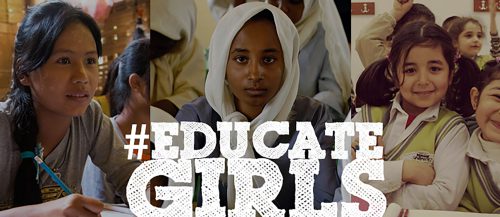
Girl’s education is not considered a priority worldwide, this needs to change!
Finals are coming up and the stress of exams and essays is starting to set in. Sometimes I catch myself wishing school would be over and I wouldn’t have to worry about assignments or going to class. In these moments, I realize I take education for granted far too often.
According to The Malala Fund, over 130 million girls are out of school today. That’s 130 million girls who don’t get the luxury of being tired of turning in assignments or listening to lectures. That’s 130 million girls who would love to have an opportunity to learn. So many young people take their education for granted. So many don’t realize the opportunities handed to them just through education.
In many societies, parents place importance on furthering boys’ education. The focus on boys opposed to girls comes from cultural views of males and females. Girls should prepare to be someone’s wife. They should worry about having children, especially having sons. They should focus on cooking and cleaning, not math and literature. Boys should focus on learning and building careers. This is an outdated mindset.
Education is a necessity every child in every country should have.
In some areas, schooling isn’t easily accessible to youth. Education as an issue for both genders, not just girls, makes it almost impossible for girls to receive schooling in these areas. Parents are more likely to prioritize the futures of their sons because more value is placed on males.
Educating girls consequently gives them more access to resources. Educated women are more likely to encourage the education of their children, which therefore creates a domino effect and leads to education becoming more widespread. With these new opportunities, women become closer to becoming more equal. The importance of schooling goes beyond positively affecting women. Educated people have the ability to make a change in not only their small communities, but also their countries as a whole. Women’s literacy is necessary for the development of third world countries.
According to UNICEF, higher literacy rates correlate with countries’ development. While literacy rates are low among the entire population in developing countries, males still have higher literacy rates than females. The development of education correlates with violence against women. Violence against women is most prevalent in rural areas generally lacking education, according to NCBI.
Improvements related to increasing literacy rates in developing countries are, according to PRB:
- Decreases in infant and child mortality
- Family health improvements
- Increases in women in the workplace, which brings up national income
- Positive effects on child nutrition due to increased household income
- Domino effect with more girls becoming educated
- More politically active women
- More women that are better informed of their legal rights
It’s really humbling to think of all the girls in other countries who haven’t had the opportunities in school that many in Western societies have had. Growing up in the United States has no doubt given me chances so many are unable to obtain. It’s so crazy that something uncontrollable like where someone is born and raised has the ability to dictate their future so much.
Making education more accessible isn’t an impossible. Here are some ways UNICEF gives to bring education to girls around the world:
- Parental and community involvement with schools
- Low-cost and close to home education
- Compensation for families’ losses while the girls are at school (in the form of stipends and scholarships)
- Flexible hours so girls have the ability to attend school and continue to help out at home
These changes seem small, but are large when it comes to the difference between a life with or without education. Schools making these changes will actually impact the lives of girls in a positive way. With small changes like these, future generations of women will eventually grow to become educated and powerful and help in breaking the cycle of poverty.
In the wise words of Malala Yousafzi, “One child, one teacher, one pen and one book can change the world. Education is the only solution. Education first.”
About the Author

Kathryn Pitts is a Political Science major at Georgia State University, pursuing a career in the non-profit sector. She is aiming to work with refugees, specifically women and children, and women’s rights on a global scale. She is passionate about volunteer work and strives to help others every day. Kathryn also enjoys playing with her dog and hiking on weekends off.